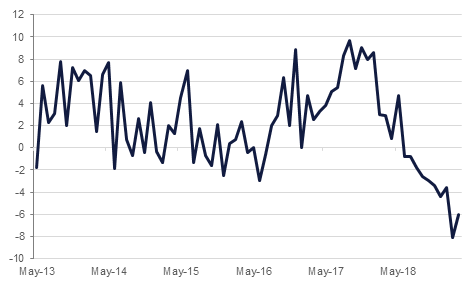
Data out of Germany remains weak, with the latest factory orders numbers missing analyst expectations despite expanding m/m for the first time since December. Orders rose 0.6%, a vast improvement on February’s -4.0% decline (revised from -4.2%), but well short of consensus forecasts of 1.4% growth. On an annualised basis, orders declined -6.0%. Domestic orders were particularly weak, offset by a 4.2% rise in exports. However, with trade tensions coming to the fore once more following US President Donald Trump’s renewed intention to impose tariffs on China, the risk to German output is to the downside.
The US and China are set to begin renewed trade talks in Washington on Thursday, as Chinese Vice Premier Liu He travels to the US. Both sides say they are prepared to talk, but the USD 200bn of US tariffs on Chinese goods threatened to begin on Friday morning remain on the table. In the UK, Conservative Prime Minister Theresa May has conceded that holding EU elections is inevitable as Brexit talks with the opposition Labour Party are floundering. De facto deputy David Lidington has said that the government’s new target date for a deal is July 2, which if realised would mean UK MEPs would not have to take their seats in the EU parliament.
The decision taken by the Turkish election board on Monday to order a retake of mayoral elections in Istanbul has heightened concerns over policy direction in the country, and a renewed depreciation in the lira, which is now trading at seven-month lows. The new vote is scheduled for June 23. President Erdogan had been highly critical of the initial result, which saw his AKP suffer one of its largest setbacks in years. Ongoing currency weakness will sustain inflationary pressures, making a rate-cut in the coming months increasingly unlikely.
The RBNZ cut its benchmark rate by 25bps to a historic low of 1.5% early this morning, while signalling a potential further cut. The kiwi dollar fell on the back of the move.
 Source: Bloomberg, Emirates NBD Research
Source: Bloomberg, Emirates NBD Research
Fixed income markets remained unsettled as tariff worries continued to escalate. Nevertheless, US treasuries traded within a narrow band, closing the day slightly lower with yields on 2yr, 5yr, 10yr and 30yr USTs rising slightly to 2.29%, 2.26%, 2.46% and 2.87% respectively. The 2yr10yr curve was marginally flatter at 16.5bps.
Uncertainty about the future of the US-EU trade relations surfaced too, causing yields on 10yr Bunds to fall below zero, currently trading at -0.04%.
Regionally GCC bonds were range bound with yield on Bloomberg Barclays index closing unchanged at 3.95% though credit spreads widened three bps to 160bps as oil prices came under slight pressure.
In the primary market, Majid Al Futtaim priced its 10yr green sukuk at MS + 220bps
NZD is this morning’s softest performing major currency in the aftermath of the RBNZ central meeting at which the central bank cut interest rates to a record low of 1.50%. As we go to print, NZDUSD is trading 0.24% lower at 0.6588, having hit a new 2019 low of 0.6527 earlier in the session. While the price remains below the one year 23.6% Fibonacci retracement (0.6575) the price is vulnerable to further declines.
Elsewhere USDJPU is trading just below the 110 level in the aftermath of the BOJ minutes from the March’s meeting. The minutes revealed that policy makers agreed to keep easing measures intact and discussed the advantages and disadvantages of further easing. Currently trading at 109.97, USDJPY remains vulnerable as long as it stays below the 50-day moving average (110.58).
Global equities embraced more losses amid fears of rising tensions in the US-China trade negotiations. Overnight, the Dow Jones fell 1.79% and S&P 500 lost 1.65%. This morning, Japan’s Topix is down 1.2%, ASX 200 is lower by 0.4% and Hang Seng futures earlier declined by 1.5%.
In sync with global counterparts, equity bourses in the GCC further weakened yesterday as fear of trade wars added to the pressure on oil prices. Dubai financial market general index closed 0.28% lower amid low traded value of AED 130 million. Abu Dhabi index fell 0.42% and Tadawul closed 1% lower.
Oil prices came under pressure yesterday, with WTI closing down 1.4% overnight at USD 61.4/b, while Brent futures dropped 1.9% to USD 69.9/b – a five-week low. Fears over geopolitical risk which had supported prices yesterday morning waned, and concerns over the potential impact a renewed trade war would have on global demand returned to the fore.
Prices have picked up modestly this morning (Brent is currently at USD 70.2/b) as supply-side fears have risen; Russia is cutting its production owing to a contamination issue.